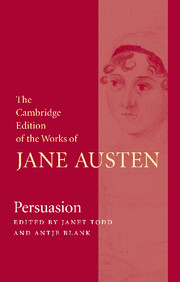Book contents
- Frontmatter
- Contents
- General Editor’s preface
- Acknowledgements
- Chronology
- Introduction
- Note on the text
- Northanger Abbey: and Persuasion
- Persuasion: Volume I
- Persuasion: Volume II
- Corrections and emendations to 1818 edition
- Appendix 1 The cancelled chapters of Persuasion
- Appendix 2 ‘Biographical Notice of the Author’ by Henry Austen
- List of abbreviations
- Explanatory Notes
Chapter 2
Published online by Cambridge University Press: 18 December 2020
- Frontmatter
- Contents
- General Editor’s preface
- Acknowledgements
- Chronology
- Introduction
- Note on the text
- Northanger Abbey: and Persuasion
- Persuasion: Volume I
- Persuasion: Volume II
- Corrections and emendations to 1818 edition
- Appendix 1 The cancelled chapters of Persuasion
- Appendix 2 ‘Biographical Notice of the Author’ by Henry Austen
- List of abbreviations
- Explanatory Notes
Summary
MR. SHEPHERD, a civil, cautious lawyer, who, whatever might be his hold or his views on Sir Walter, would rather have the disagreeable prompted by any body else, excused himself from offering the slightest hint, and only begged leave to recommend an implicit reference to the excellent judgment of Lady Russell,—from whose known good sense he fully expected to have just such resolute measures advised, as he meant to see finally adopted.
Lady Russell was most anxiously zealous on the subject, and gave it much serious consideration. She was a woman rather of sound than of quick abilities, whose difficulties in coming to any decision in this instance were great, from the opposition of two leading principles. She was of strict integrity herself, with a delicate sense of honour; but she was as desirous of saving Sir Walter's feelings, as solicitous for the credit of the family, as aristocratic in her ideas of what was due to them, as any body of sense and honesty could well be. She was a benevolent, charitable, good woman, and capable of strong attachments; most correct in her conduct, strict in her notions of decorum, and with manners that were held a standard of good-breeding. She had a cultivated mind, and was, generally speaking, rational and consistent—but she had prejudices on the side of ancestry; she had a value for rank and consequence, which blinded her a little to the faults of those who possessed them. Herself, the widow of only a knight, she gave the dignity of a baronet all its due; and Sir Walter, independent of his claims as an old acquaintance, an attentive neighbour, an obliging landlord, the husband of her very dear friend, the father of Anne and her sisters, was, as being Sir Walter, in her apprehension entitled to a great deal of compassion and consideration under his present difficulties.
They must retrench; that did not admit of a doubt. But she was very anxious to have it done with the least possible pain to him and Elizabeth. She drew up plans of economy, she made exact calculations, and she did, what nobody else thought of doing, she consulted Anne, who never seemed considered by the others as having any interest in the question.
- Type
- Chapter
- Information
- Persuasion , pp. 12 - 18Publisher: Cambridge University PressPrint publication year: 2006
- 1
- Cited by

